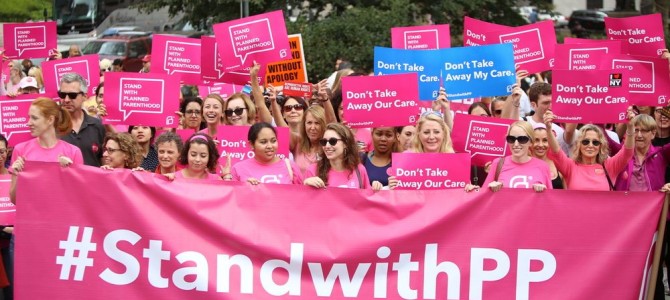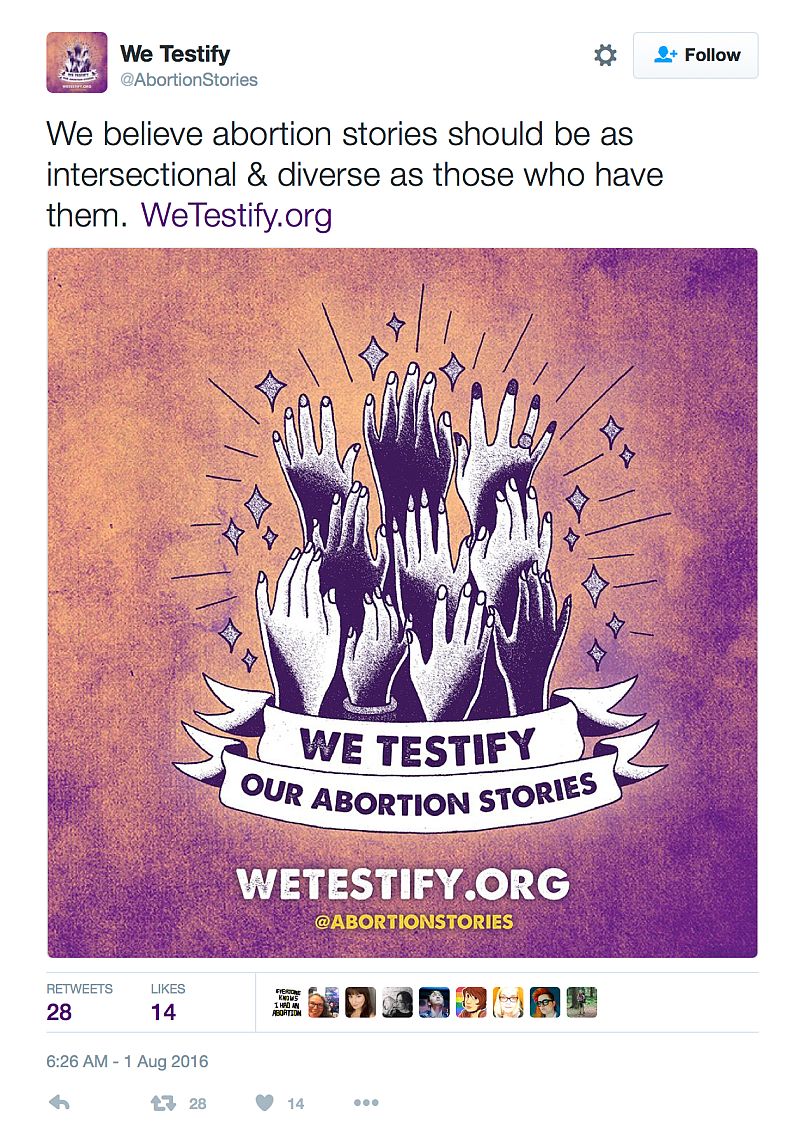
Evidently the “Shout your abortion” campaign to make killing babies in the womb as common and acceptable as possible by having women share their abortion stories isn’t diverse enough. According to a new website, We Testify, women “of color, from rural communities, who are queer identified” need support, too.
This tweet says it all:

This reminds me of a “Factual Feminist” podcast by Christina Hoff Sommers on intersectionality, in which she describes being at a conference where the women were asked to divide into groups based on their own particular form of oppression. The women split off first by race. Then those broke off into groups based on sexuality, which fragmented into groups of women who had children, until those split into groups that suffered from allergies, and on and on it went until intersectionality began to eat itself.
This is what We Testify represents—the fragmentation of victimized groups. First, it was women in general who needed to share their abortion stories so they would no longer be stigmatized, but that wasn’t good enough. White, rich women were getting too much attention. The stigma might be lifted for them, but what about others who don’t look like them? That’s what We Testify wants to fix, by giving voice to women like Jack Qu’emi Gutiérrez, who are “non-binary” or who don’t have insurance or who are of mixed race.
“Every day someone chooses to have an abortion,” the website says. “We are not alone in this decision, however, due to stigma, we’re often made to feel isolated and shamed. Our stories remind us and those around us that we’re not alone. We testify as experts to our experiences. We testify that our spirituality and abortion are one.”
It’s not really clear how their spirituality and abortion are one, except to say that the two are joined together as part of their truth, identity, and particular form of oppression, whatever that might be.
The Gospel of Abortion
The program, which was created by the National Network of Abortion Funds and has been enthusiastically welcomed by Planned Parenthood, says it wants to preach its message of abortion by seeking “to build the leadership of abortion storytellers to speak out and bring the complexity and nuance of our lives to the conversation around abortion.”
They do this, as their name represents, by “testifying” to their experiences. If the term strikes you as particularly religious, it is—and that’s on purpose. In the Christian community, people often testify of their conversion and faith. We Testify says this is just what they’re doing—it’s their truth, their form of evangelism as women share their testimonies everywhere, including in their churches, where they “testify before their congregation and spiritual leaders.”
“We hold the moral high ground in trusting people to make their own decision about abortion,” they say. “We are redefining who the experts are on abortion. We Testify because we are the experts in our own lives, our abortion experiences, and our truths.”
To promote their gospel of abortion, they also have a store where they sell clothing and paraphernalia that proudly declares “I had an abortion!” If that’s not disturbing enough, read what they wrote in the Swag Store blurb: “We Testify is a project dedicated to increasing the spectrum of abortion storytellers in the public sphere, and ensuring we look fly as we do it! SLAY in our custom We Testify swag.”
You read that right. “SLAY” is urban slang for “Kill it.” One has to wonder if they get the chilling irony. Given the pride they have in their abortions, maybe they do.
Turning a Victimizer Into a Victim
We Testify is just more evidence of the moral confusion and self-idolization of a society ruled by relativism, subjectivism, and perpetual victimization. Gone is the truth that abortion is itself an evil. Now, the focus is on the person having the abortion. They, not the baby whose life has been taken, are the ones who are the true tragic figures. They’re the victims, they’re the unfortunate ones, in this quest for moral justification.
These women think telling stories, sharing experiences, will somehow validate their immoral choices. They’re wrong. This is just one example of the sad tale of fallen humanity from the dawn of time, that an individual who has committed an unimaginable evil finds comfort and support when she is attached to a group. But group identity and group reinforcement do nothing to erase the fact that what the individual, or the group, has done is terribly wrong.
Reading the “testimonies” of these people with “intersectional identities” is an exercise in frustration as you try to figure out what their real point of “oppression” is. Is it their poverty, their race, their sexuality? Is it all of it together? If so, can any of us really find people who are “just like us,” or will we keep fragmenting like Sommer’s seminar until we’re just as alone as when we started?
Guiterrez is a prime example. She says she had an abortion when she was 20, “a poor undergraduate student in a crumbling relationship with poor mental health. . . . I’m an AfroLatinx person with no health insurance (Florida chose not to expand Medicaid so I fall into the Affordable Care Act’s wage gap).”
So, she’s poor, with no health insurance, young, mentally ill, and mixed-race. But there’s more. “It wasn’t just the physical and logistical aspects of having a medicinal procedure, but the emotional labor of navigating a space where I was constantly misgendered. Misgendering a trans person is an act of violence; to be repeatedly called by the wrong pronouns was almost as draining as the procedure itself. Around that same time, Florida passed legislation that required an individual to have a trans-vaginal ultrasound before undergoing their abortion. Experiencing that only set off far too many feelings of dysphoria, violation, and shame.”
In addition to everything else, she’s a transgender individual who is more shamed by receiving a trans-vaginal ultrasound than by getting an abortion. The “violence” she suffered wasn’t having a life ripped out of her body, but being called the wrong pronoun. (She did mention that she’s “mentally ill,” right? I’d say so.)
I’m a Precious Snowflake, Unlike My Baby
“I had always been an advocate for reproductive rights, but it wasn’t until later that it became clear to me how casually cissexist and heteronormative that movement is,” she writes. “I’ve put in over five years of time and energy into reproductive health, rights, and justice initiatives, but many groups simply profit off of my labor without any regard for people like me. We are an invisible minority that need access to reproductive healthcare just as much, if not more, than the highly visible communities we see directly addressed in the media. . . . Cissexism has no place in this movement and I intend to show it the way out.”
So, unless the pro-choice movement is also sensitive to poor, mixed race, transgender, uninsured women or “men” (I could go on, because I’m sure Gutierrez has other distinctive characteristics besides the ones she listed), then it is continuing to stigmatize a minority and bring shame on those who share their pro-choice agenda.
This perpetual fragmentation is what happens when you reject objective truth (even about yourself) and moral absolutes. Society is fractured to the point that there is no common ground, cohesion, or unity. If every individual creates her own identity, establishes her own truth, and determines her own morality—and anyone who opposes it or refuses to support it is oppressing her—then we will all end up isolated victims wondering why there aren’t others “just like me.”









